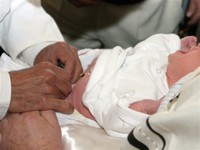Facts about Circumcision

Eastern Christians never wholly abolished the practice of circumcision, and the Abyssinians, living among largely Muslim populations, find it a useful hygienic precaution.

The word "circumcision" comes from Latin circum (meaning "around") and caedere (meaning "to cut").

The origin of circumcision in the Philippines is uncertain, with both western and Muslim influence being probable factors.

Infant circumcision was taken up in the United States, Australia and the English-speaking parts of Canada and to a lesser extent in the United Kingdom and New Zealand.

Circumcision helps control the accumulation of smegma, but proper hygiene can also do this.

Saint Paul was particularly adamant in his opinion against the circumcision of Gentile believers.

Circumcision is a fundamental rite of Judaism, initiated as a sign of God's covenant with Abraham and his descendants.

A study in 1987 found that the prominent reasons for parents choosing circumcision were "concerns about the attitudes of peers and their sons' self concept in the future," rather than medical concerns.

At present, the medical literature on the health, including sexual health, implications of circumcision is contradictory, and often subject to claims of bias in research.” Cost-benefit analyses have varied.

Prior to 1989, the American Academy of Pediatrics had a long-standing opinion that medical indications for routine circumcision were lacking.

First Maccabees also relates that the Seleucids forbade the practice of brit milah (Jewish circumcision), and punished those who performed it—as well as the infants who underwent it—with death.

In Canada (where public medical insurance is universal, and where private insurance does not replicate services already paid from the public purse), individual provincial health services began delisting circumcision in the 1980s.

During the Spanish Inquisition, inspectors considered the circumcision of the sons of Jewish converts to Christianity to be evidence that the convert was insincere in his conversion, which was a capital crime.

Male circumcision is a religious commandment in Judaism, expected in Islam, and customary in some Oriental Orthodox and other Christian churches in Africa.

The origin of circumcision in Islam is a matter of religious and scholarly debate.

The infant circumcision rate in Canada has fallen from roughly 50 percent in the 1970s to 13.9 percent in 2003.

Traditionally, Turkish circumcisions are celebrated with sweets and the "Sьnnet Dь?ьnь," or "Circumcision Feast/Celebration."

Traditionally, circumcision has been presumed to be legal when performed by a trained operator.

Others argue that there is no convincing evidence of sexual or emotional harm in male circumcision, and that there are much greater monetary and psychological costs in circumcising later rather than in infancy.

More than 90 percent of South Korean high-school boys are now circumcised, but the average age of circumcision is 12 years.

Opponents condemn male infant circumcision as a human rights abuse and a genital mutilation similar to female genital cutting, while advocates of circumcision regard it as a worthwhile public health measure.

Male Circumcision is a surgical procedure that removes some or all of the foreskin (prepuce) from the penis.

The meeting between Paul and the senior apostles known as the Council of Jerusalem declared that circumcision was not necessary for Gentile believers.

The oldest documentary evidence for circumcision comes from ancient Egypt.

The British Medical Association, states “there is significant disagreement about whether circumcision is overall a beneficial, neutral or harmful procedure.

Circumcision is common in the Middle East, North America (U.S. and Canada), Australia, and parts of Africa and Asia, especially the Philippines and South Korea.

The time of circumcision differs from culture to culture: either shortly after birth, during childhood or around puberty as part of a rite of passage.

Circumcision is also commonly practiced in the Polynesian islands of Samoa, Tonga, Niue, and Tikopia.

In 1855, the Quaker surgeon, Jonathan Hutchinson, observed that circumcision appeared to protect against syphilis.

Circumcision ceremonies among certain Australian aboriginal societies are noted for their painful nature, including subincision for some aboriginal peoples in the Western Desert.

After the destruction of the Temple in 70 C.E., Christianity took on a less Jewish character, and was soon to become an essentially Gentile religion, in which Paul's teachings against circumcision were the norm.

Circumcision in South Korea is largely the result of American cultural and military influence following the Korean War.

Circumcision is nothing and uncircumcision is nothing, but keeping the commandments of God is what matters (I Corinthians 7:18-19).

Nevertheless, some mainstream Christian traditions still keep a "Feast of the Circumcision," commemorating Jesus' own circumcision on the eight day after his birth.

Opponents argue that the medical benefits of circumcision are uncertain, and that removal of healthy genital tissue from a minor should therefore not be subject to parental discretion.

In 1949, the United Kingdom's newly formed National Health Service removed infant circumcision from its list of covered services.

The writer of the 1 Maccabees wrote that under the Seleucids, many Jewish men attempted to hide or reverse their circumcision so they could exercise in Greek gymnasia, where nudity was the norm.

So smegma—which collects under the foreskin—was viewed as unhealthy, and circumcision was seen as good penile hygiene.

Circumcision was common, although not universal, among ancient Semitic peoples.

The Greek Orthodox Church celebrates the Circumcision of Christ on January 1, while those Orthodox churches following the Julian calendar celebrate it on January 14.

Circumcision predates recorded human history, with depictions in stone-age cave drawings and Ancient Egyptian tombs.

Some Islamic scholars hold that circumcision is recommended, others that it is obligatory.